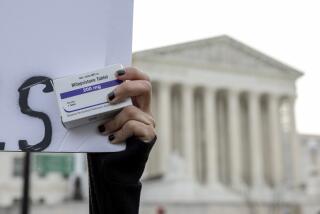Uncle Pharma’s Mischief in a Bottle
Let’s get this straight....
A major pharmaceutical CEO gets hauled up in front of Congress to do the congressional version of a perp walk. The executive’s company stands accused of one of the worst drug screw-ups in recent history.
Meantime, an FDA official, a scientist with an impeccable scientific track record who had managed to predict almost all of the major drug recalls, testifies that the drug should have been targeted for intense study and possible withdrawal up to three years earlier. The CEO is lauded on the business page for his affability and straightforwardness. The Food and Drug Administration is nailed on the front page for not doing its job. The scientist is profiled as a “devout Catholic,” a “loner” and being against RU-486.
To ask the obvious: What is that all about?
The answer is an uncomfortable one for most Americans, who pride themselves on having a solid sense of anti-business populism. It is this: For many of us, “pharma” has become family, and the FDA has become the scorned black sheep of the clan, no matter what it does.
Perhaps more precisely, in our minds and our culture, pharma has become Uncle Pharma, a go-ahead fellow who, like one’s occasionally errant but always charming bachelor uncle, shows up unannounced on the doorstep brandishing exotic trinkets from some far-off land, trinkets so amazing that they seem to transform your little world before Uncle, without a word, vanishes into the void. Against him, the FDA can hardly compete. All it can say for itself is “no,” a distinctly un-American command if there ever was one.
Pharma has joined the family just as pills have become the primary way that Americans think about healthcare, and just as those pills have become increasingly all about treating chronic disease. Chronic diseases are notoriously tough to cure, and success in doing so often turns on patient compliance -- taking the pills as prescribed, avoiding other meds, following lifestyle recommendations. Intimate issues, as they say.
It used to be that encouraging treatment compliance was the sole province of one’s physician. Now the gentle hectoring often comes either directly or indirectly from pharma itself, often through free sample programs, online disease management programs and, of course, direct-to-consumer advertising. A recent campaign for one new drug conjures the haimish feeling beautifully. “Cholesterol,” it proclaims. “It’s about food and family.” And money. Just ask Raymond Sacchetti, the head of “compliance and persistency” at Bristol-Myers Squibb. Sacchetti, a star in the pharmaceuticals marketing firmament, once made a study of patient compliance and what he called “adherence marketing.” He can prove that direct-to-consumer ads result in “better persistence.” As he tells it: “If you do 160 days of DTC ads, well, you get a 35% rate of compliance after 12 months. But if you do 250 days of DTC ads, you get 65%!” That leads to more prescription renewals and more profits for the industry.
The payoff for both patient and industry could be even better, Sacchetti says, if HMOs were not so chintzy in their reimbursement departments, constantly making bigger and bigger demands on everyone to justify long drug regimens. That’s why the push for prescriptions must come via a motivated patient, and that, he believes, will only happen when patients trust Big Pharma a lot more: “We want people to feel like they can snuggle up to us at night,” he says, and that can happen only at “the magic moment.”
What is that magic moment? It is when the first prescription is written. After all, “the doctor sits in loco parentis,” Sacchetti explains. The first prescription is thus the most powerful moment -- its clarity and drama determine whether a patient gets motivated enough to push for the drug. Pharma, he concludes, should target more resources into sculpting that drama. And, by all signs, that is exactly what it is doing.
And just what, exactly, is wrong with that? The obvious answer is that a for-profit pill company should not be driving medical treatment, which should be the province of the independent physician. But managed care has all but extinguished that breed, or at least made it impossible for such doctors to make a living without going on a psychiatric regimen themselves.
And so pharma fills the void, the role of tribal chief, shaman or, less exotically, a gently hectoring uncle. The FDA, so often the spoilsport to the consumer-patient’s primary allegiances, fills the role of outcast, the object of easy scorn, either by the left, for failing to protect us from Uncle Pharma’s excesses, or by the right, for not letting Uncle practice his magic freely enough.
Whether the new-style pharma family will grow dysfunctional or evolve responsibly is one of the great unknowns in modern medicine. Only time will tell whether Uncle settles down or takes off for parts unknown, leaving us holding the bottle.






